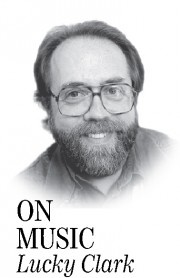Those of you who have been enjoying the 2017-18 season of the Concerts at Jewett Series have one final performance coming up on May 20 as classical music takes the stage with award-winning pianist Chiharu Naruse. Naruse holds a master’s degree in music performance and in music instruction from the Hochschule fur Musik Hanns Eisler in Berlin. She has performed throughout the world in recitals and piano competitions including a piano concert to benefit Amnesty International in Germany, the Hyogo Piano Competition in Japan (silver prize), the Clara Haskil piano competition in Switzerland, the Pescara Academie Piano Competition in Italy and the International Mozart Wettbewerb in Slazburg, Austria. She currently lives in Maine and is a faculty member at the Portland Conservatory of Music and a member of the Applied Music faculty at Bates College.
She was at her office in Lewiston when I reached out for a phone interview to learn more about her and the concert she’ll be presenting.
Q: I understand that you’ll be a part of the Concerts at Jewett series coming up this coming Sunday, correct?
Naruse: Yes.
Q: Have you performed there before?
Naruse: Yes, I have done it, I think, three times now.
Q: What kind of program will you be presenting?
Naruse: I am presenting a concert of solo piano music by several composers: Schumann, Chopin, Beethoven and Ravel.
Q: I see that I’m calling you at Bates College, what is your role there?
Naruse: At Bates I teach piano instruction and it is basically a piano lesson. Students will receive a half-credit per semester.
Q: How many students do you have?
Naruse: I have around 30 students per semester, some students are very advanced and some are totally beginners.
Q: How long have you been working at Bates?
Naruse: Umm, let me see, I’m close to 10 years now.
Q: You must love what you’re doing there.
Naruse: Oh, I do! I enjoy teaching there because of the many different backgrounds and nationalities. I have taught students from the Middle East, Russia and Africa. They tell me all about their country life and differences, introducing them to Western classical piano music is such a pleasure. Also some of my students bring up and discuss with me the psychology or neuron science aspect of piano study which means I learn from my students, as well.
Q: Could we run through some of the compositions you will perform at Jewett? For example, you mentioned Beethoven, what of his works are you presenting?
Naruse: I will play two of Beethoven’s piano sonatas. Both compositions are op. 27. Op. 27 no. 2 No. 14, “Moonlight Sonata,” is very popular but not op. 27 no. 1 No. 13, “Quasi Una Fantasia,” is a more interesting piece. I decided to put both sonatas in the same program and the audience can enjoy the differences between these two sonatas.
Q: And Ravel?
Naruse: I’ll be playing his Sonatina, and I’ll be playing a Berceuse by Chopin, as well.
Q: Have you done any recordings in your career?
Naruse: I have been working these past three years with PARMA Recordings. They specialize in contemporary music and they will pair up composers with musicians to produce new music for CDs. This year I had the privilege of recording a solo piano album composed by Kenneth Kuhn.
Q: Is that CD out yet?
Naruse: No, it will be released some time towards the end of this year or early next year.
Q: Now I understand that you moved from Japan to the U.S. in 2002 to study piano under Frank Glazer. You have since moved to Maine and have a family here, correct?
Naruse: I have two children ages 7 and 9. My life right now is very busy with teaching and also being a parent. I’m trying to balance my piano life and family life. When I was in the music conservatory in Berlin my professor demanded us to practice eight hours a day, but at the same time he said that we would be lucky to be able to do that. I totally understand that view now. I wish I could practice eight hours! My practice time is now up and down. I’m trying to find time here and there to do it as much as I can.
Q: How do you find life here in Maine?
Naruse: Besides piano, I am enjoying all about Maine’s organic life style, we raise chickens and we also garden and tap for maple syrup. I can’t be thankful enough to my husband, who comes from Maine, for introducing me to a different life than the piano.
Q: Is there anything you would like to passed on to the folks reading this article about your upcoming concert?
Naruse: I am hoping to build up a younger audience. I have two children, and I know how difficult it is to fit a concert into their schedules and also have them sit quietly during the concert and guide them how to appreciate it. Any parent who wants to stay just for the first half of the concert, maybe have some refreshments during the intermission, and then not stay for the second half of the concert is fine. Any amount of exposure to arts/music will give the children different experiences, and I believe when they grow up this experience will come back in a positive way.
Lucky Clark, winner of a 2018 “Keeping The Blues Alive” Award, has spent 49 years writing about good music and the people who make it. He can be reached at luckyc@myfairpoint.net if you have any questions, comments or suggestions.
Send questions/comments to the editors.



